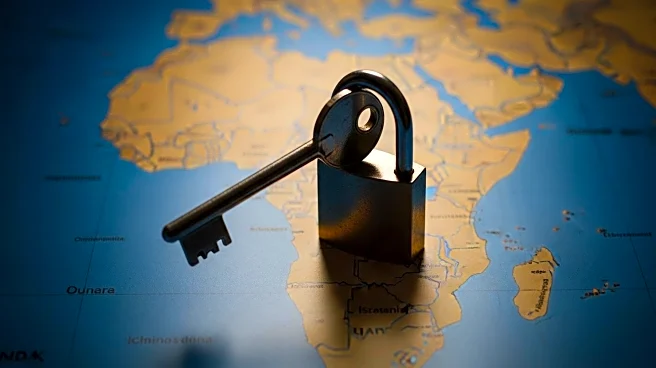What's Happening?
The Trump administration's third-country deportation program is facing criticism after reports emerged that three men deported to Eswatini have been held in a maximum-security prison without charge or legal access. These deportations are part of a broader initiative to send migrants to African nations, including South Sudan, Eswatini, and Rwanda, with a potential agreement with Uganda. The program has been criticized for its lack of transparency and due process, as highlighted by the Legal Aid Society, which represents one of the deportees, Orville Etoria. Etoria, a Jamaican national, was deported despite his home country's willingness to accept him back. The U.S. Department of Homeland Security justified the deportations by labeling the men as dangerous criminals, but lawyers argue that the deportees have already served their sentences in the U.S.
Why It's Important?
This situation raises significant concerns about the U.S. immigration policy under President Trump, particularly regarding human rights and legal processes. The deportation program's secretive nature and the indefinite detention of deportees in foreign prisons without legal recourse highlight potential violations of international human rights standards. The situation also underscores the broader implications of U.S. immigration policies on international relations, especially with countries involved in these deportation agreements. Critics argue that such policies could damage the U.S.'s reputation as a proponent of human rights and due process, potentially affecting diplomatic relations and cooperation with affected countries.
What's Next?
The situation may prompt legal challenges and increased scrutiny from human rights organizations and international bodies. There could be calls for greater transparency and accountability in the U.S. deportation process, as well as demands for the U.S. government to ensure that deportees are treated in accordance with international human rights standards. The affected individuals' legal representatives may seek to challenge their detention in international courts, potentially leading to diplomatic tensions between the U.S. and the countries involved in the deportation agreements.
Beyond the Headlines
The deportation program's expansion to African nations with questionable human rights records raises ethical concerns about the U.S.'s role in potentially facilitating human rights abuses. The lack of transparency and due process in these deportations could set a concerning precedent for future immigration policies, both in the U.S. and globally. This situation also highlights the broader issue of how countries handle deportees and the responsibilities of nations to ensure humane treatment and legal rights for all individuals, regardless of their immigration status.










